|
Page Twelve
( and those secondary pages ) " Riff - Raff and Puffin "
in the V.I.P. Loungeby Deborah Kerr
|
 |
|
|
|
|
|
|
|
|
|
|
|
|
|
|
|
|
|
|
 |
 id and passwordBIZZEN = KISSEK
id and passwordBIZZEN = KISSEK
|
OUTRAGEOUS
DIRECTORS:
Erich von Stroheim
Alfred Hitchcock
Cecil B. DeMille
Otto Preminger " Live in the United States. I originally was born in Vienna, and lived there a long time. In the United States, one of the most precious rights we have is the right of free expression. I have had trouble with censorship, with the small movie, THE MOON IS BLUE, because in 1953 people objected to the word "virgin," which is hard to believe. I could have easily made a few cuts and compromised, but I feel that in our own fields, as motion picture directors, newspapermen, writers, whatever we are, we have not only the right, but the duty to defend this right of free expression; because if this right deteriorates, that is the first step to dictatorship, to totalitarian government, and no totalitarian government, whether on the Right or on the Left, could ever exist with its citizens having the right to speak freely. I think it is very important for us to fight for this right and that is why I have always fought censorship and won. There is no censorship in the United States. I hope it will stay like this. That is my answer to questions about censorship. My views have never changed. " ----- Otto Preminger
Ontario Film Theatre,
Toronto, October 1970 Otto Preminger was born in 1905 (not 1906, as usually reported), the son of a prosecutor for the Austrian Empire. Otto studied law but wanted to become an actor, and at 17 joined the company of Max Reinhardt. He rose quickly to director, was chosen to take over Reinhardt's theater on the latter's retirement, and was offered, at age 27, the post of the head of the State Theatre in Vienna. He turned it down on learning that a condition of assuming the post was conversion to Catholicism (the Premingers were Jewish, although Otto was not religious).
Preminger's theater successes came to the attention of film and theater producers in America, and in 1936, he arrived in Hollywood to direct for 20th Century-Fox. His Hollywood career floundered until, in 1944, he was assigned to produce and, eventually, direct the film version of Vera Caspary's mystery novel Laura. The result was a hit that solidified Preminger's reputation and has endured as a classic.
Andy Warhol
Charlie Chaplin
Victor Fleming
Elia Kazan
Elia Kazan turned his attention to directing the Broadway production of Robert Anderson's autobiographical TEA AND SYMPATHY. Despite prodding from Anderson, his good friend, Kazan agreed only reluctantly to consider Deborah Kerr, already an established film star, for the pivotal role of Laura Reynolds. Decades later, in his autobiography ELIA KAZAN: A LIFE< Kazan credited Deborah and her "immaculate delicacy" with making the stage production a success.
Although not tied to a particular historical incident, TEA AND SYMPATHY offers a powerful indictment of male tribalism, conformity, and homophobia in Eisenhower's America. Based on the highly acclaimed 1953 Broadsway play by Robert Anderson, Tea and Sympathy 1956 tells the story of Tom Lee, a "sensitive" boy tormented by his boarding school classmates for refusing to behave like a "regular guy." A loner and an intellectual, he spends time by himself listening to classical music, reading poetry, and singing folk songs; he sews curtains for his dorm room and folds his sweaters neatly. For this he pays the terrible price of being ostracized and bullied by his classmates. The major adult authority figures in Tom's world, including his housemaster, join thr boys in insisting that Tom conform. Even his father, horrified to hear his son mocked as a " sister-boy, " demands that Tom cut his hair, drop out of the school play - in which he is supposed to wear a dress - and act like a " regular guy. " The films sympathies are clearly with Tom..
THE FILM: " Tea and Sympathy "
1956/USA/Color
DIRECTOR: Vincent Minnelli; PRODUCER; Pandro S. Berman;
SCREENPLAY: Robert Anderson; STUDIO: Metro-Goldwyn-Mayer
VIDEO: MGM/UA;
APPROX. RUNNING-TIME 122 Mins.
Elia Kazan Quick BIO - URL:http://www.geocities.com/akatsavou/kazan_en.html
I read in Elia Kazan's autobiography that Marilyn Monroe came to his house the night that Joe DiMaggio proposed to her and that she wanted to celebrate her impending marriage by sleeping with Kazan, I felt for a variety of reasons that it was a story that didn't need telling. Why couldn't Kazan take that story to the grave with him without putting it into print? Did he think telling a story like that, while DeMaggio was still alive, would enhance his reputation as a great cochsman? It does something for hid reputation but I don't think that's it.
URL:http://www.findarticles.com
John Huston
Anjelica Huston : Ever since I can remember, I was of show business. One of the first things I do recall was being in Tobago. My father John Huston was making " Heaven Knows, Mr. Allison " [1957] starring Robert Mitchum and Deborah Kerr when I was three years old. The fact that my father was making a movie was not so extraordinary for me, it was my life. Some people had fathers who were bankers or farmers, my father made films, that's how I saw it. As for the movie stars, they were just around, some of them were friends, others weren't, it was all just a part of my everyday life.
Billy Wilder
When it came time to choose a mansion for Norma Desmond, the faded silent-screen star of Sunset Boulevard, Wilder decided on the "wildly exaggerated" style he had seen so often in the 1930s. His script called for a "house in the style of early Wallace Beery," and he found what he was looking for on Wilshire Boulevard - a vast pile that had been built in 1924. To give it an even more Gothic feeling, Paramount added stained-glass windows, a pipe organ and heavy velvet draperies. The stage was set for a great star of the 1920s to indulge her fantasies.
The hard part was finding an actress to play Desmond. Wilder first considered Mae West. But after a long talk with her he came to the conclusion that with West in the role his movie would be a "kind of Laurel and Hardy" comedy, not the serious film he planned. Two other stars, Pola Negri and Mary Pickford, were then interviewed. But Negri's accent was too heavy, and Pickford was too prim to portray the kind of woman who would keep a young man. "I didn't even dare to tell her the whole story because I knew that she was a very proper Early American," he recalled.
Finally, he turned to Gloria Swanson, and it was she who made Norma Desmond into one of the most haunting and memorable characters in the history of the cinema. "We were very, very lucky to dig up old Swanson," he says. "We loved working with her." ("Old Swanson" was actually only fifty-two when she journeyed down Wilder's bumpy boulevard.)
PORTRAIT: Billy Wilder - SUNSET BOULEVARD'S Creator Talks / by Gerald Clarke from April 1994 ARCHITECTURAL DIGEST
Vincent Minnelli
|
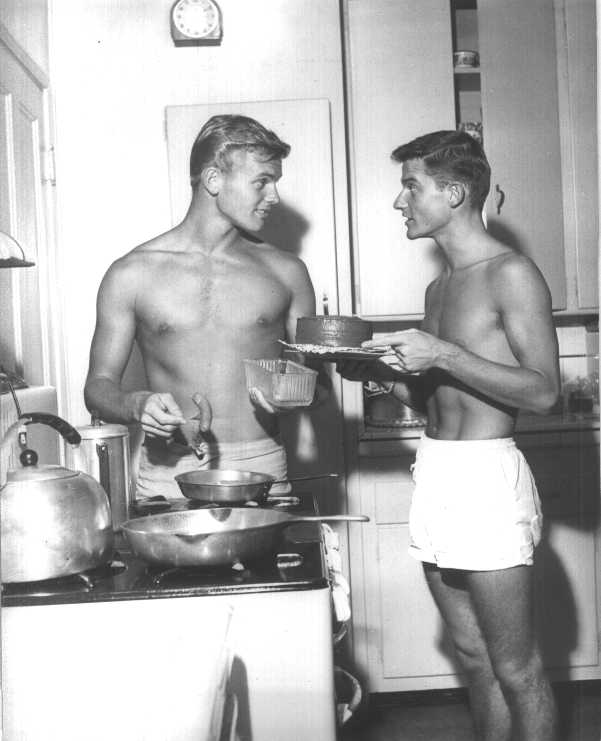 TM Photo from the Hugh Miles-Hutchinsen/Hiller Collection c2003 All Rights Retained Hereto
TM Photo from the Hugh Miles-Hutchinsen/Hiller Collection c2003 All Rights Retained Hereto
|
|
|
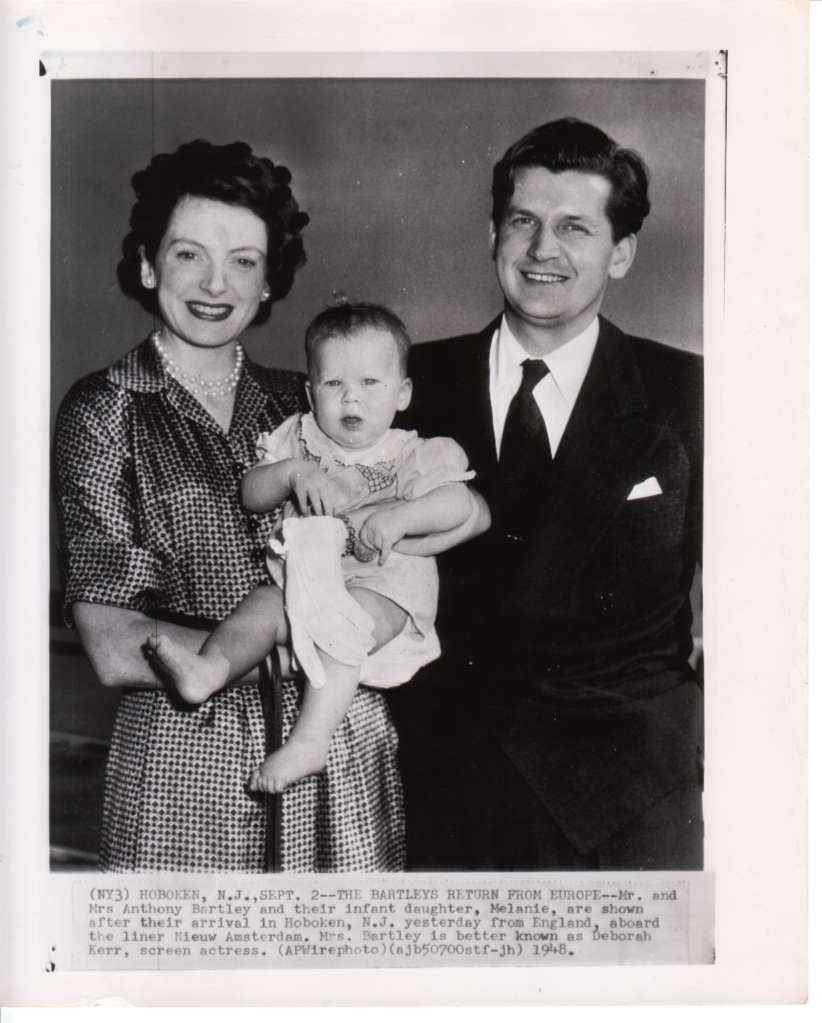 TM Photo from the Hugh Miles-Hutchinsen/Hiller Collection c2003 All Rights Retained Hereto
TM Photo from the Hugh Miles-Hutchinsen/Hiller Collection c2003 All Rights Retained HeretoDeborah Kerr Acts Up & Out . . .
She Rules in Three New Films " Count Your Blessings " ~ 1959 " The Journey " ~ 1959 " Beloved Infidel " ~ 1959 Now. it's one thing to beguile a nws hen and it's something else entirely to work them up into a frenzy. Unwittingly - or wittingly - Gregory Peck had just such an effect on a slightly less well-known Hollywood columnist named Sheilah Graham. She was a pretty British chorus girl turned reporter who had been the mistress of F.Scott Fitzgerald in the late 1930s. Fitzgerald, a not-so-recovering alcoholic was out in Hollywood doing screenwriting to pay for his wife Zelda's confinement to a mental hospital and his daughter Scottie's Vassar tuition. Sheilah truly loved Scott and even wrote a book about their tender and tortured romance called BELOVED INFIDEL. It eventually became a motion picture starring Deborah Kerr and - who else? - Gregory Peck. But Fitzgerald wasn't much of a lover. In fact, Graham admitted she never saw him naked. He died in 1940 and, though she grieved many years for him, she was, well, horny. So when Gregory hit town, her fantasy life kicked into overdrive.
In her lusty memoir, A STATE OF HEAT, she writes: ' . . . now, driving to the studios, driving back home, when I read the trade papers, when I ate, all of the ime, I thought about sex, mainly imagining myself in the arms of Gregory Peck, who always flirted with me. He narrowed his eyes and looked meaningfully at me through the slits while I asked him Questions. I became confused and forgot what I was saying. I would almost have an orgasm. Just imagining Gregory Peck making love to me was enough to turn my loins into warm liquid.' Now we come to one of Gregory's 'turkeys.' In "Beloved Infidel," he found himself absurdly miscast as the frail, alcoholic writer, F.Scott Fitzgerald. Although Mr. Peck was proud of his raucous drinking scene in the movie, it was always one he preferred to forget. "Every film is a risk, artistically and financially,' Gregory said philosophically, 'and none of us is bomb-proof.'
His co-star, Deborah Kerr, proved equally unsuited to her role as Fitzgerald's on-the-make mistress, Sheilah Graham. The refined and elegant English actress gave the impression of being, in the words of Sir Laurence Olivier, 'unreasonably chaste.'
As with many projects that are better skipped, Mr. Peck agreed to co-star in "Beloved Infidel" as a matter of expediency. He admitted: 'Deborah Kerr and I both did it to kill off final commitments we had made to Fox.' ( Deborah was a top name in the late 1950s, demonstrated by her 1959 Golden Globe as the world's most popular female star. ) Gregory Peck dismissed the Graham-Gerald Frank BELOVED INFIDEL book as a potboiler. "What Sheilah Graham wrote was a Cinderella story: a cockney girl who clawed her way to the heights, which means becoming a syndicated Hollywood gossip columnist.'
Graham, who had been hired as a consultant on the film, strongly objected to the casting of Gregory and Deborah as the leading figures in her personal drama. She later wrote: "Greg was too tall and self-contained for Scott, Deborah Kerr too thin and ladylike for me. ( I had second thoughts about the latter after reading Stewart Granger's autobiography in which he implied that he and Deborah had an affair in a taxi in London. ) Marilyn Monroe or Jean Simmons would've been better in my part, and for Scott, Richard Basehart, the poetic fool in "La Strada."' Too many cooks stirring the script made it exceedingly difficult not only for Greg but also for Deborah. ' The film wasn't all bad, but it became disjointed, between Sheilah's original story, the film script and Greg's own writers, and I was unable to characterize, because half the poor woman's personality was cut out. It was difficult for me to pick up the threads halfway through her life and, for my own self, be genuine. I wasn't able to show where she came from, and what she was, and why she became the way she was later on.'
' I had a big drunk scene,' Greg explained. ' I pushed her and slapped her around. She ran for a gun and I wrestled it away from her. Finally, the gun went off and brought me to my senses. Well, I had rehearsed that at home about 200 times. We rehearsed it on the set, and while they were setting it up, I had a couple good shots of vodka to set me on edge - because I wanted to go all out. I wanted there to be a certain wildness and an uncontrolled frustration and fury in this man.'
As Sheilah Graham tells it, she found a gun in Fitzgerald's dresser drawer and he tackled her to the floor to get it back. Graham threw it across the room and screamed, 'Take it! Shoot yourself, you son of a bitch! See if I care. I didn't pull myself out of the gutter to waste my life on a drunk like you!' As Greg remembered it, the scene was 'funny, outrageous and very true to life.' Maybe a little unorthodox but 'still we got a helluva scene out of it.'
The director, Henry King, wasn't amused. In fact, he was shocked. He contended, Greg 'scared Deborah Kerr half to death. Greg had a strong temper and he liked to drink. Plus, he was big and strong. Did his wife, children or friends ever see him behave in a frightening manner after imbibing? After viewing the rough cut of the movie on the 20th of November 1959, Greg fired off yet another three-page, single-spaced letter regarding the script flaws. He pleaded for a postponement of the film until the script could be reworked altogether, but to no avail.
Nobody was happy with the movie - at least, almost nobody. ' I was heartbroken that "Beloved Infidel" did not do what it should have done,' said Deborah Kerr, 'but, on the other hand, I understood Gregory Peck's point of view, and I was happy to work with him.' Sheilah Graham was scathing in her criticism of the film, claiming 'even Bing Crosby' would have made a more credible F.Scott Fitzgerald. She waited anxiously for the reaction of Fitzgerald's daughter, Scottie, assuming the young woman would also have it. But Scottie never saw "Beloved Infidel" in the theaters. At a later date, she caught it on television, adored it, and phoned Graham to say: ' I thought Gregory Peck was so like Daddy! ' from the biographical writing
( only in part )Gregory Peck
A Charmed Life by
Lynn Haney c2003
|
|
|
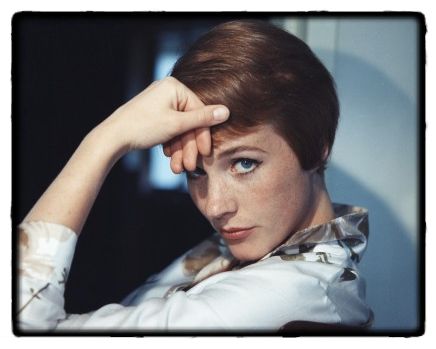 TM Photo from the Hugh Miles-Hutchinsen/Hiller Collection c2003 All Rights Retained Hereto
TM Photo from the Hugh Miles-Hutchinsen/Hiller Collection c2003 All Rights Retained Hereto
|
|
|
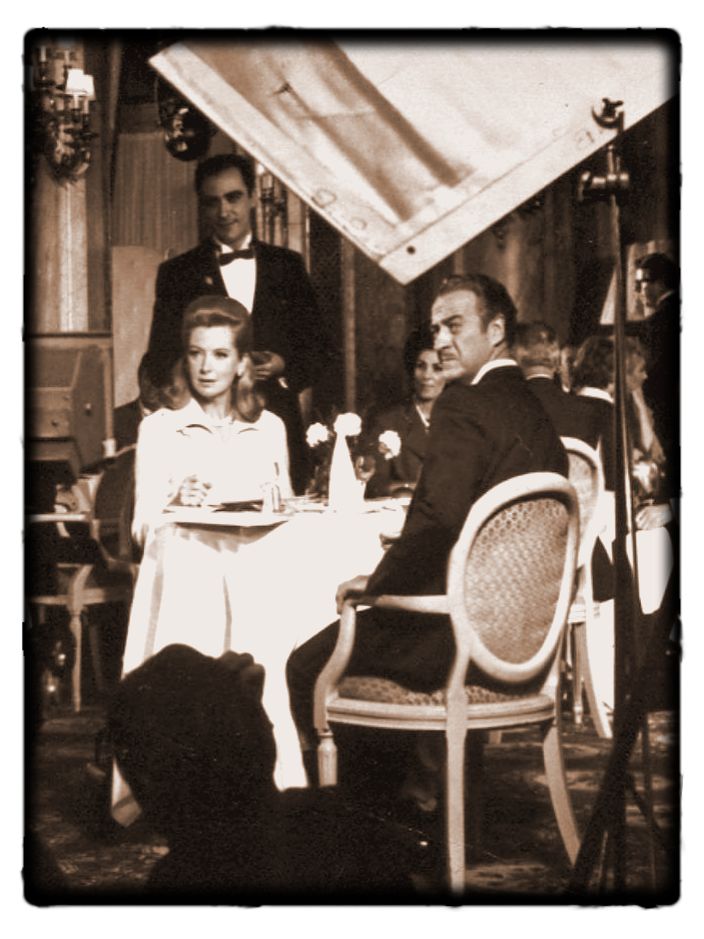 TM Photo from the Hugh Miles-Hutchinsen/Hiller Collection c2003 All Rights Retained Hereto
TM Photo from the Hugh Miles-Hutchinsen/Hiller Collection c2003 All Rights Retained Hereto
|
|
|
 Filmland Magazine
Filmland Magazine
December, 1956
Screen Stories Magazine
March, 1957
Purchased from a recent Estate Auction. This issue with movie spreads for Don Murray in "The Batchelor Party," Robert Mitchum and Deborah Kerr in "Heaven Knows, Mr. Allison," Audrey Hepburn, Fred Astaire in "Funny Face", Van Johnson, Piper Laurie in "Kelly and Me," Susan Hayward, Kirk douglas in "Top Secret Affair," Jeff Chandler and Jeanne Crain in "The Tattered Dress," Ava Gardner, Stewart Granger, David Niven in "The Little Hut," Donald O'Connor with Anne Blyth in "The Buster Keaton Story."________________________________________
|
|
A Most Embarrassing Hollywood Moment
Greer
Garson: Academy Award winner Greer Garson once took 125 takes to say "no" in the 1947 film DESIRE. Costar Robert Mitchum said, "I gave up being serious about motion pictures when I made a film with Greer Garson, and she took 125 takes to say 'no.' " _________________________________________ Of course I knew Laurence Olivier and Danny Kaye were having a long-term affair. So did all of London. So did their wives. Why is America always the last to know? --- Dame Peggy Ashcroft Listen, the love between two men is beautiful. I'd love to be between, say, Tyrone Power and Montgomery Clift. . . .Hell, I was bon the wrong gender! --- Nancy Walker We lived in fear of an expose, or even one small remark, a veiled suggestion that someone was homosexual. Such a remark would have cauded an earthquake at the studio. . . .The amaing thing is that Rock [Hudson], as big as he became, was never nailed. It made one speculate that Rock had an angel on his shoulder. . . .He seemed under supernatural protection. --- George Nader I knew right away that Rock Hudson was gay when he did not fall in love with me. --- Gina Lollobigida Noel [Coward] and I were in Parris once. Adjoining rooms, of course. One night, I felt mischievous, so I knocked on Noel's door, and he asked, "Who is it?" I lowered my voice and said, "Hotel detective. Have you got a gentleman in your room?" He asked, "Just a minute, I'll ask him."
--- Beatrice Lillie
[Filming The Man Who Would Be King]: We were in this little town on the edge of the Sahara, and there was nothing to do at night except go to this disco. But it was all men dancing with men because women weren't allowed out at night. so we're standing at the bar, watching all these guys dancing, when Sean [Connery] leans over and says to me, "Do you mind if I dance with your driver? Mine's too ugly."
--- Sir Michael Caine
Everyone in New York City knows that Tony Perkins's marriage is just a front. He still has male lovers . . . . Tony couldn't settle down with another guy because he's insecure and craves kinky affairs, not a genuine or lasting relationship. tony isn't exactly Norman Bates [of Psycho], but he's awfully kinky . . . .
--- Halston
I'd always heard around town that Robert Taylor was bisexual, that his marriage to Barbara Stanwyck was arranged, and that she was also gay. So when i met Taylor, I figured we'd have something in common, right? Wrong! I was open, he was not only closeted, he was right wing and a witch-hunter, not at all friendly or honest or even smiling.
--- Sal Mineo
I heard Gene Kelly in an interview, a very interesting interview, and I thought it was a dead giveaway. He said, "You know, it's a shame that a guy can't dance without being called a homosexual," and then went into this long routine defending himself - you know, "I'm married and have kids . . . . "
--- Louise Brooks
Garbo and I starred in Grand Hotel, but we had no scenes together. Alas. For her, and her alone, I could have been a lesbian.
--- Joan Crawford
Bea's passion [in Hollywood] was directed at Greta Garbo, the first woman she'd ever seen who wore slacks in public.
--- Hollywood columnist Sheilah Graham
Charlton Heston costarred with me in The Agony and the Ecstasy . . . . He was in ecstasy over getting to play someone like Michelangelo, and I was in agony over his vanity, his ego, the delays . . . . He treated me as a supporting actor in spite of it being the story of two titans and their relationship. I wasn't playing one of Michelangelo's boyfriends, I was the pope, for heaven's sake!
--- Sir Rex Harrison
Rock Hudson let his gay agent marry him off to his secretary because he didn't want people to get the right idea.
--- Anthony Perkins
Elsa Maxwell, the hostess with the mostest, was probably Hollywood's most renowned lesbian. Of course, she wasn't in the movies; she couldn't have been, the way she looked . . . If Elsa had been a beauty, she'd have had a chance of getting in the movies, and in that case, I'm sure she'd have feigned to have a boyfriend. She could be freer than the actresses because she wasn't obligated to a movie contract with its "morals clause," and because she wasn't a figure men dreamed and fantasized about.
--- Merle Oberon
Clifton Webb was fascinating to watch and listen to, a born wit. He was his own greatest creation . . . his roles were all molded in his own personality . . . . He never married, but nobody would think of bringing up that topic. However, I heard that a director once asked him, face-to-face, "Are you a homosexual?" and Webb replied, "Devout!"
* * * * * * * * * * * * * * * * * * * * * * * * * * * * * * * * * * * * *
Boze Hadleigh has written the book
HOLLYWOOD BABBLE ON:
Stars GOSSIP about other STARS
the written matter above are from that book.
He lived in Beverly Hills, California, within earshot of the babbling stars.
Copyright 1994 by Boz Hadleigh
A Birch Lane Press Book
Published by Carol Publishing Group - pages 143, 144, 147, 148, 152, 153, 159, 163, 165, and 166
* * * * * * * * * * * * * * * * * * * * * * * * * * * * * * * * * * * * * *
PARADE
THE SUNDAY NEWSPAPER MAGAZINE
June, 2003 ?
Q - Stars of 'yesterdays' were people you could look up to. Why do 'today's' stars go around without make-up and always look like they slept in their clothes ?
A - In the old days, powerful studio bosses ordered stars to project an image of unattainable glamour. Today, nobody tells the stars how to dress, so you get Gwyneth Paltrow wearing flip-flops and Brad Pitt scratching his stubble.
|
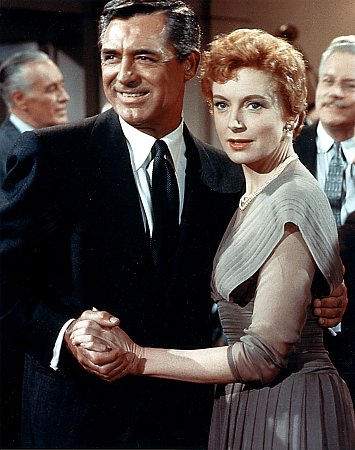 TM Photo from the Hugh Miles-Hutchinsen/Hiller Collection c2003 All Rights Retained Hereto
TM Photo from the Hugh Miles-Hutchinsen/Hiller Collection c2003 All Rights Retained Hereto
|
|
|
Robert Taylor . . . . . . . . . . . . Robert Mitchum . . . . . . . . . . . . Yul Brynner
Van Johnson . . . . . . . . . . . . Robert Donat . . . . . . . . . . . . Spencer Tracy
Rex Harrison . . . . . . . . . . . . Stewart Granger . . . . . . . . . . . . Marlon Brando
Sir Ralph Richardson . . . . . . . . . . . . Hugh Williams . . . . . . . . . . . . Sir Peter Ustinov
Roger Livesey . . . . . . . . . . . . Anton Wallbrook . . . . . . . . . . . . Burt Lancaster
David Niven . . . . . . . . . . . . Rod Taylor . . . . . . . . . . . . Sir John Mills URL:http://www.cinerhama.com/britalent/bt01.html
|
|